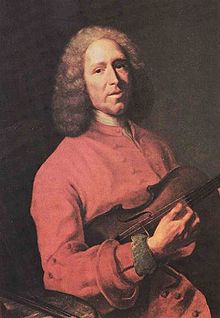- Dardanus (opera)
-
This article is about the opera by Rameau. For the opera by Sacchini, see Dardanus (Sacchini).
Jean-Philippe Rameau  Operas
Operas- Hippolyte et Aricie (1733)
- Les Indes galantes (1735)
- Castor et Pollux (1737)
- Les fêtes d'Hébé (1739)
- Dardanus (1739)
- La princesse de Navarre (1745)
- Platée (1745)
- Les fêtes de Polymnie (1745)
- Le temple de la Gloire (1745)
- Les fêtes de Ramire (1745)
- Les fêtes de l'Hymen et de l'Amour (1747)
- Zaïs (1748)
- Les surprises de l'Amour (1748)
- Pigmalion (1748)
- Naïs (1749)
- Zoroastre (1749)
- La guirlande (1751)
- Acante et Céphise (1751)
- Daphnis et Eglé (1753)
- Les sibarites (1753)
- La naissance d'Osiris (1754)
- Anacréon (1754)
- Anacréon ( different version, 1757)
- Les Paladins (1760)
- Les Boréades (unperformed)
- Nélée et Myrthis (date unknown)
- Zéphire (date unknown)
- Io (unfinished, date unknown)
- Lost operas
Dardanus is an opera in five acts by Jean-Philippe Rameau. The French libretto was by Charles-Antoine Leclerc de La Bruère.
Contents
Performance history
It was first performed at the Académie de musique in Paris on November 19, 1739. It received 26 performances, mainly because of the support from Rameau's followers in the dispute between the styles of Rameau and Lully.
Critics accused Rameau's original opera of lacking a coherent plot. The inclusion of the sea monster also violated the French operatic convention of having a clear purpose for encounters with supernatural beings.
In 1744 (with help from Simon-Joseph Pellegrin)[1], and again in 1760, Dardanus was revised extensively in an attempt to correct its shortcomings. Large portions of the score were sacrificed in favour of plot but some scenes as arresting as the "Prison scene" (1744) were added in the process.
Dardanus was produced three times in the 20th century: in 1907 at Dijon, in 1979 at the Opéra de Paris, and finally in 1998, in a concert version, at the time of a recording (below) by Marc Minkowski. The Royal Academy of Music also staged Dardanus in London in 2006.
Roles
Role[2] Voice type[3] Premiere Cast, November 19, 1739[4]
(Conductor: - )Vénus soprano M.lle Erémans (also spelled Erremans or Herémans) l'Amour soprano M.lle Bourbonnais (also spelled Bourbonnois) Dardanus, son of Electra and Jupiter haute-contre Pierre Jélyotte Iphise, daughter of Teucer soprano M.lle Pélissier Teucer, a King bass-baritone François Le Page (also spelled Lepage) Anténor, a King bass-baritone M. Albert Isménor, a magician bass-bariton François Le Page (also spelled Lepage) a Phrygian man bass-baritone a Phrygian woman soprano Marie Fel First Dream soprano Second Dream haute-contre Jean-Antoine Bérard[5] Third Dream bass Jean Dun, fils a Pleasure soprano Retinue of Venus and Cupid, Sports and Pleasures, retinue of Jealousy, people, warriors, magicians, Phrygians, Dreams: choir Dancing characters Act 1 - Phrygian warriors: L. Javillier (a warrior), L. Dallemand (a Phrygian woman); Act 2 - Magicians: C. Maltaire (a magician); Act 3: Phrygian people: L. Maltaire et M.lle Mariette (Phrygian man and woman);
Act 4: Air spirits: David Dumoulin and Marie Sallé (Dreams); Act 5 - Sports and Pleasures, Charites: Louis Dupré, Matignon, M.lles Le Breton and Barbarine (Sports and Pleasures)Synopsis
The original story is loosely based on that of Dardanus. However, in the opera, Dardanus is at war with King Teucer, who has promised to marry his daughter Iphise to King Antenor. Dardanus and Iphise meet, through the intervention of the magician Isménor, and fall in love. Dardanus attacks a monster ravaging Teucer's kingdom, saving the life of Anténor who is attempting, unsuccessfully, to kill it. Teucer and Dardanus make peace, the latter marrying Iphise.
Recordings
- In 1980 Raymond Leppard recorded Dardanus with Frederica von Stade as Iphise but unfortunately omitted the prologue. Leppard otherwise followed the 1744 version of the opera.
- In 1998 Marc Minkowski recorded Dardanus with John Mark Ainsley as Dardanus, Veronique Gens as Iphise and Laurent Naouri as Anténor. Minkowski's Musiciens du Louvre used period instruments in this recording and Minkowski followed the original 1739 version of the opera with the addition of two numbers from the 1744 version. This recording now "easily replaces Raymond Leppard's 1980 recording of the work"[1] as the benchmark recording of Dardanus.
- In December 2005, in a collaboration between Cantillation and the Orchestra of the Antipodes, Pinchgut Opera of Sydney Australia presented the 1739 version of Dardanus informed in part by additions from the 1744 version. The role of Dardanus was played by British tenor Paul Agnew, Paul Whelan as Antenor, Kathryn McCusker as Iphise and Stephen Bennett as Teucer. Conducted by Antony Walker, the performance was the first production of a Rameau opera in Australia on period instruments. The production was recorded by ABC Classics.
References
- Notes
- ^ Sadler, p. 1077. Pellegrin's first name is wrongly reported as Pierre-Joseph
- ^ sources: Sadler; Dizionario dell'opera, accessed 5 February 2011
- ^ the basse-taille parts are indicated as for bass-baritone
- ^ sources: Lajarte, Le magazine de l'opéra baroque, both accessed 5 February 2011
- ^ in 1744 Bérard interpreted the role of Arcas, introduced in the second version of the opera (Le magazine de l'opéra baroque, accessed 5 February 2011)
- Sources
- (French) de Lajarte, Théodore, Bibliothèque Musicale du Théatre de l'Opéra. Catalogue Historique, Chronologique, Anecdotique, Paris, Librairie des bibliophiles, 1878, Tome I, ad nomen, pp. 191-92 (accessible online for free in scribd.com)
- Sadler, Graham, Dardanus (i), in Sadie, Stanley (ed.), The New Grove Dictionary of Opera (I, pp. 1077-79), Grove (Oxford University Press), New York, 1997 (ISBN 978-0-19-522186-2)
- (Italian) Dizionario dell'opera in "delteatro.it" (article: Dardanus), Baldini Castoldi Dalai editore
- (French) Le magazine de l'opéra baroque
- Rameau Le Site, Horvallis 2003-2010
- Warrack, John and West, Ewan, The Oxford Dictionary of Opera New York: OUP: 1992 ISBN 0-19-869164-5
External links
Categories:- French-language operas
- Operas by Jean-Philippe Rameau
- Tragédies en musique
- Operas
- 1739 operas
- Operas based on Greco-Roman mythology
- Paris Opera world premieres
Wikimedia Foundation. 2010.
